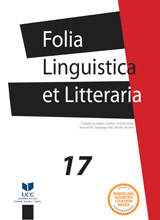SUPREMACY AND MODES OF DISCOURSE IN THE MERCHANT OF VENICE
SUPREMACY AND MODES OF DISCOURSE IN THE MERCHANT OF VENICE
Author(s): Andrijana Stokić Penda, Petar PendaSubject(s): Theory of Literature, British Literature
Published by: Filološki fakultet, Nikšić
Keywords: Merchant of Venice; William Shakespeare; Discourse; Supremacy;
Summary/Abstract: This paper combines both linguistic and literary examination of the employment of nominal and pronominal forms of address in The Merchant of Venice. Depending on their mode of use and context, these forms of address can empower or disempower either addressees or addressers. Such forms of address can, for example, denote closeness, distance, familiarity, hesitation, social and hierarchical position. Nominal forms, whether names, titles, occupations or offensive modes of address, consist of either single (a nominal consisting of only one element, e.g., ‘Shylock’) or combined forms (a nominal consisting of two or more elements, e.g., ‘My sweet Portia’). Combinations of different forms (e.g., a name and a title or a name preceded by an adjective) are common and they strengthen or diminish a character’s power. In The Merchant of Venice, pronominal forms, especially you and thou, serve to promote and uphold Elizabethan ideas of order, racial intolerance towards Jews, and obedience to the sovereign. They also serve to maintain patriarchal values and societal hierarchy in general. Thus you is normally used to show respect, distance or formality, while thou is used to show disrespect, closeness or informality. However, the language of Shakespeare’s time is transitional, with many remnants of Middle English.
Journal: Folia Linguistica et Litteraria
- Issue Year: 2017
- Issue No: 17
- Page Range: 167-180
- Page Count: 14
- Language: English

